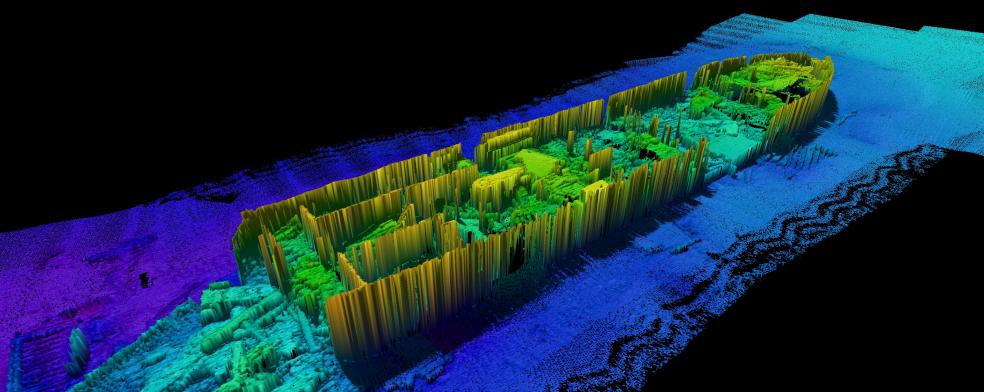
Plymouth University invests in new sonar system for marine studies
Plymouth University has invested in a new state-of-the-art sonar system that will enable students to map the underwater world and visualise in detail features such as shipwrecks.
The Multi-Beam Echo Sounder (MBES) will be used on board the University’s teaching and research vessels and has already been tested off the coast of Devon and Cornwall over wrecks such as HMS Scylla and the SS James Eagan Layne.
Any student in the University’s Marine Institute who is studying hydrography will have access to the kit, which has been supplied by Swathe Services, based in Truro, Cornwall.
Professor Simon Handley, Dean of the Faculty of Science and Environment, said: “Very few universities in the country can boast such a cutting-edge system, one which opens a window into the sub-sea world. It’s further evidence of Plymouth’s commitment to the student experience and its world-leading marine and maritime pedigree.”
The MBES sends a beam of sound into the water and can receive multiple beams back from the seabed or a feature below the sea surface up to a depth of 400 metres, and using specialist software, can accurately measure latitude, longitude, and the height of the feature. It will enable University researchers to conduct seabed mapping, and will be used in fieldwork trips by any student whose degree includes hydrography, such as Ocean Exploration.
The sonar will also be used by professional students who’ve enrolled on its Hydrographic Academy – an innovative partnership with multi-national giant Fugro that provides higher education and postgraduate programmes for those in the off-shore sector. Launched last year, there are more than 100 students from all over the world studying through the Hydrographic Academy.
Jon Holmes, of the Hydrographic Academy, said: “Using the MBES of this quality is a bit like taking a photo, but better. It provides intelligent data, such as how deep the water is, or how tall a shipwreck might be. It offers students an invaluable insight into different hydrographic scenarios, from updating charts, to investigating obstructions on the seabed, mapping marine habitats and carrying out surveys for oil and gas.”
The sonar and supporting system and software will also be made available to commercial companies as part of the University’s engagement with the South West Marine Energy Park.
James Williams, Managing Director of the Swathe Group of companies, added: "We are really pleased to be able to continue our support of the University through the provision of first-class equipment and software. We have always enjoyed getting involved with the next generation of surveyors and this is a terrific opportunity for students of the new Hydrographic Academy and the Marine Institute to see the latest innovations from leading manufacturers in the industry."










